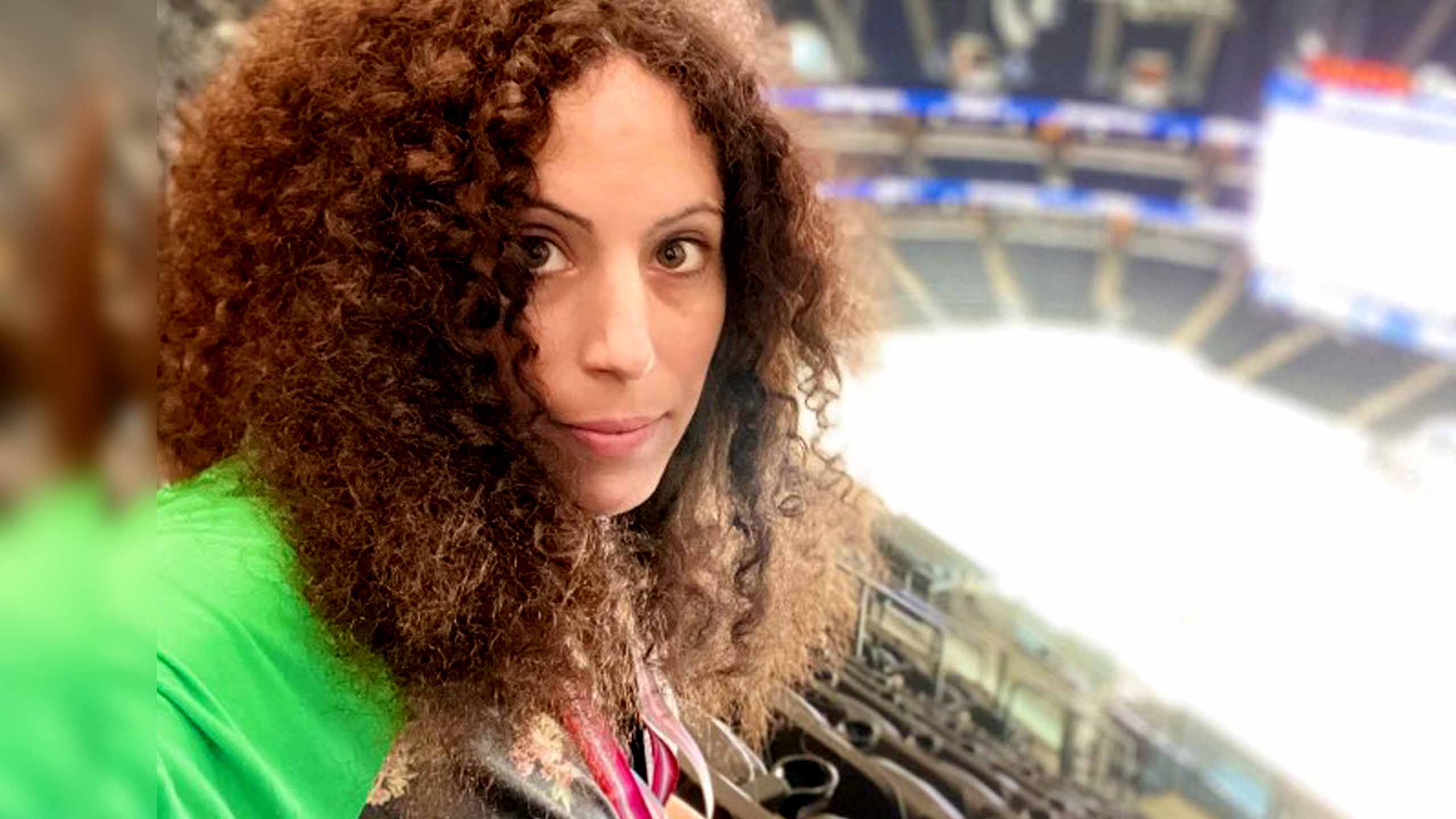If you’re ever at an Anaheim Ducks game, look up and you might be able to spot it. It’s not the giant one that used to make for an impressive backdrop for Lindsay Imber as she sat at the organ in the Honda Center, light blue, pink and white stripes behind her, but it’s still there, sitting in a cup atop the instrument—a trans flag proudly displayed behind the glass of the organist’s booth.
Imber took the large trans flag down after a fan complained, emphasizing why her presence in the National Hockey League (NHL) is so important. Imber has been the organist for the Ducks since the 2015 playoffs, responsible for helping shape the in-game fan experience with live music. And since going public with her transition in 2021, she is also the most visible trans employee of the NHL, a sports league that has struggled mightily when it comes to LGBTQ2S+ inclusion, especially in the last year or so when even allowing players to sport rainbows on the ice has seemingly been too controversial.
“I, very early on in this whole process, decided, ‘I’m not going to be private about this,’” Imber tells Xtra over Zoom. “I could, theoretically, but it wouldn’t serve the game, it wouldn’t serve anyone.”
Most fans are likely familiar with the organist as the person who plays “Charge!” and similar hype songs to get the crowd involved in a game. But an organist does much more than that—they’re there to add flourish and to augment the game, to provide commentary about what’s happening on the ice. For Imber, that means it’s a way for her to combine her love of sports with her love of statistics and numbers (she sees playing the organ as being like an equation) and her sense of humour (she does a lot of “pun work” with her song selection).
If there’s an icing call, Imber might play “Ice, Ice Baby.” “If there’s a tripping call that you happen to disagree with—like if [an opponent] has very clearly embellished it and dove and gone super dramatic, you can play an equally super dramatic and out-of-place song,” she says. “My go-to is ‘My Heart Will Go On.’”
Imber’s officiating background—she has been officiating high school basketball for over 15 years and runs a Major League Baseball umpire analyst website—also comes in handy, as the role of an organist requires being able to quickly discern which penalty is being called, who it is being called on and what the correct musical response to the call should be.
Sports organists gained popularity through their presence at baseball games, with live music being introduced to the stadiums around the Civil War. In hockey, too, they were a staple of the fan experience, with the Chicago Blackhawks debuting a live organist at Chicago Stadium in 1929. In recent decades, sports organists have become a bit of a dying breed as technology means that anyone can press a button on a computer to play a tune, though they’re seeing a resurgence, as evidenced by Imber’s hiring by the Ducks. She came on for the 2015 playoffs and the team decided to keep her on for the following season, after the role had been on hiatus for the previous eight years. As of last year, only seven of the 32 NHL teams did not employ an organist.
Imber’s journey to becoming a sports organist is perhaps a bit non-traditional, but it’s also the kind of job that’s rare enough as to not really have a very typical trajectory. She was classically trained on the piano from the age of seven, but she had had an interest—something she describes as “maybe even a fixation”—in sports organ from an early age. When the now 35-year-old was a child in Southern California, Nancy Bea was the organist for the Los Angeles Dodgers (Bea retired from the role in 2015 after 28 seasons) and Imber remembers being “very much intrigued” by what Bea did. So when Bea released an album in 2003, Imber went out and got it.
Imber taught herself to play organ on a Casio portable keyboard set to the organ function while in college at University of California, Irvine. When she first started subscribing to the MLB.TV app, she would watch games in her living room and play along with her keyboard. After college, Imber got a job working in the security department at Dodger Stadium. She would stay late to avoid the crushing Los Angeles-area traffic and while she waited, she began heading up to the organ booth to tinker around.
In 2014, fate stepped in. The Ducks and the Los Angeles Kings faced off at Dodger Stadium in the NHL Stadium Series and Imber met Dieter Ruehle, the longtime organist for the Kings (Ruehle also took over Dodger organist duties from Bea after she retired). They spent some time chatting and when the Ducks were looking for someone to step in on the organ for the 2015 playoffs, Ruehle recommended Imber for the gig.
“Lindsay is superbly equipped in the key characteristics that make for a successful and well-regarded sports organist,” says Josh Kantor, the organist for the Boston Red Sox. “She has terrific taste, a first-rate ear for breaking songs down and arranging them for solo instrumental performance, an impeccable understanding of how to spotlight melody, great enthusiasm for musical whimsy and a fantastic ability to connect meaningfully with fans.”
Kantor notes that Imber’s transition “seems to have given her a comfort level that has especially strengthened her abilities on those last two traits”—whimsy and fan connection. This was on full display when she released an album of organ covers of music that connected with her experience after going public with her transition. The album included covers of “Man” by Neko Case and “Transgender Dysphoria Blues” and “True Trans Soul Rebel” by Against Me!
“Lindsay’s an incredible player, and it’s so cool that she would take something I wrote and repurpose it and put her own spin on it,” Laura Jane Grace, the lead singer of Against Me! tells Xtra. Grace became aware of Imber through social media and loves knowing that arenas full of people who may not even know what they’re listening to can hear and appreciate her music.
During the Ducks inaugural Pride Night last season, Imber broke out “True Trans Soul Rebel” for the crowd. The subversive nature of an Against Me! song being played on an NHL game isn’t lost on Grace. “I think that kind of subversion is my favourite kind of subversion—where people don’t even realize what’s going on around them,” she says. “It proves to you that it’s about the music, not who made it.”
Imber has unwittingly, though not necessarily reluctantly, become “the spotlight for Pride Night in terms of personnel.” Because she is the only openly LGBTQ2S+ person in the Ducks organization who is visible to the public, “there is no scenario where I can get away from that,” she says. It’s why, when the NHL banned the use of rainbow Pride Tape by its players before the start of this season, Imber felt she needed to say something.
The memo released by the league said that “players shall not be put in the position of having to demonstrate personal support for any Special Initiatives” (which includes Pride and diversity initiatives) and that included “whether a player is required to be in close proximity to any groups or individuals visibly or otherwise clearly associated with such Special Initiative(s).”
“Did I just get banned from the NHL for being trans?” Imber wondered on X, formerly Twitter.
“If there is a policy saying no one has to associate with a Special Initiative person, whether or not it’s Pride Night, that’s me,” Imber says. “Whether I’m doing a Pride thing or whether I’m just existing as a human being, that’s me.”
The ban on Pride Tape was such a PR mess that the NHL reversed it just 14 days later. They have not rescinded the decision they made at the end of last season to halt the use of Pride Night jerseys. But while league-wide and locker room culture can be a hostile place for LGBTQ2S+ people, Imber says her Ducks colleagues are supportive.
“They’ve been wonderful and great about the whole thing,” she says. “It’s such a nice, tight-knit group of people that I work with [in entertainment]. The complication, of course, becomes the greater corporate structure, but what I’m trying to do is be mostly positive in terms of promoting inclusion values, as opposed to criticizing.”
Imber is also visible on social media, interacting with fans and showing queer and trans people that there is a place for them in the sport of hockey even if it doesn’t always feel like it. That’s been her goal from the very beginning of her journey of being a trans person in public.
“Seeing the events of the last year where the NHL appeared to turn its back on the LGBTQ2S+ community at every opportunity, it’s very encouraging to see someone like Lindsay not only able to work in the league, but very openly be herself,” Katie Macke, a 28-year-old trans Ducks fan tells Xtra.
“I became a Ducks fan while growing up in Southern California,” she continues. “I feel a much stronger connection to the Ducks in large part because they have Lindsay there [because it seems like] they make her comfortable to be her whole authentic self.”
And that authenticity and unabashed ability to be nothing but herself is inspiring others in the field too. “Lindsay’s excellence in the field, along with the deeply genuine nature of her kindness and her self-advocacy, makes me proud to know her and delighted to get to talk shop with her,” says Kantor, who says he feels honoured to get to call Imber a colleague.
Imber’s impact is reverberating beyond sports too. “I’m such a big fan of what Lindsay does; I’d love to be there sometime to hear it happen live,” says Grace—a big compliment from someone who notably says she hates sports.
“I’ll also extend the invitation that any time I am playing in the area, if Lindsay wants to come and bring a keyboard and jump up on stage and do a track with me, I’m totally down for the collaboration.”
From a keyboard in her living room to the organ at the Honda Center, and now to being recognized by one of her idols? Pretty punk rock for a sports organist.


 Why you can trust Xtra
Why you can trust Xtra


